Ditapis dengan
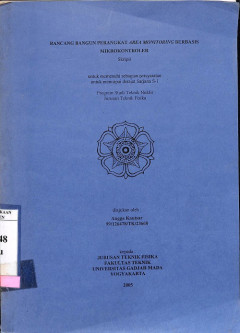
Rancang Bangun Perangkat Area Monitoring Berbasis Mikrokontroler
Salah satu metode proteksi radiasi adalah dengan melakukan pengawasan terhadap paparan radiasi di suatu area. Dalam penelitian ini dilakukan rancang bangun perangkat area monitoring berbasis mikrokontroler. Mikrokontroler At89C51 berfungsi sebagai sistem pencacah. Personal Computer berfungsi sebagai penampil dan penyimpan hasil cacahan. Komunikasi antara system pencacah dengan PC menggunakan st…
- Edisi
- -
- ISBN/ISSN
- -
- Deskripsi Fisik
- x, 82 p. : Illus. ; 12 cm
- Judul Seri
- -
- No. Panggil
- 621.48 KAU r
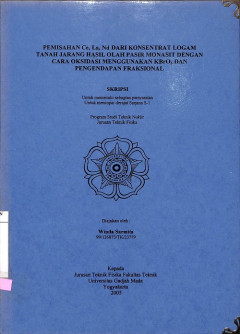
Pemisahan Ce, La, Nd Dari Konsentrat Logam Tanah Jarang Hasil Olah Pasir Mona…
Pasir monasit merupakan mineral yang banyak mengandung Th dan unsur-unsur dari logam tanah jarang yang sangat bermanfaat dalam bidang industri nuklir maupun dalam bidang industri non nuklir. Mengingat manfaat yang dimiliki oleh logam tanah jarang dan tersedianya logam tanah jarang tersebut cukup banyak di Indonesia, maka perlu dilakukan suatu penelitian untuk dapat memisahkan unsur-unsur terseb…
- Edisi
- -
- ISBN/ISSN
- -
- Deskripsi Fisik
- xxii, 100 p. : Illus. ; 19 cm
- Judul Seri
- -
- No. Panggil
- 621.48 SAR p
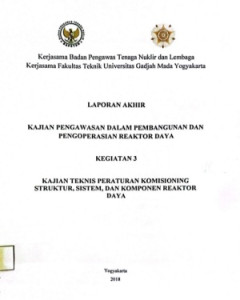
Laporan Akhir Kajian Pengawasan Dalam Pembangunan dan Pengoperasian Reaktor D…
Laporan kajian ini berisi delapan bab yang terdiri dari Bab 1 Pendahuluan, Bab II Pembangunan dan Pengoperasian Reaktor Daya Nuklir, Bab III Komisioning Pembangkit Daya Nuklir, Bab IV Tahapan Komisioning Nujklir, Bab V Kajian Regulasi Mengenai Komisioning Nuklir, Bab VI Pembelajaran Komisioning Fasilitas Nuklir dan Non Nuklir, Bab VIII Tinjauan Raperka Tentang Ketentuan Keselamatan Komisioning …
- Edisi
- -
- ISBN/ISSN
- -
- Deskripsi Fisik
- xii, 129p.;29x20cm
- Judul Seri
- -
- No. Panggil
- 621.4835

Pemisahan La dan Th Dari Konsentrat Torium LTJ Oksalat Hasil Olah Pasir Monas…
Pasir monasit merupakan mineral yang banyak mengandung logam tanah jarang dan torium (Th). Mengingat pasir monasit di Indonesia keberadaannya melimpah dan banyak kegunaan logam tanah jarang dan torium untuk industri nuklir dan non nuklir, maka perlu usaha untuk mendapatkan unsur-unsur tersebut. Oleh karena itu perlu dilakukan suatu penelitian untuk dapat meisahkan unsur-unsur tersebut diantaran…
- Edisi
- -
- ISBN/ISSN
- -
- Deskripsi Fisik
- v, 86 p. : Illus. ; 17 cm
- Judul Seri
- -
- No. Panggil
- 621.48 FIR p
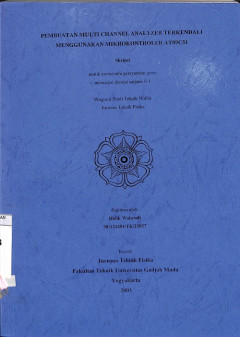
Pembuatan Multi Channel Analyzer Terkendali Menggunakan Mikrokontroler AT89C51
Dengan semakin berkembangnya mikrokontroler yang merupakan teknologi yang relatif baru dengan ukurannya yang kecil, maka perlu dirancang dan dibuat suatu peralatan MCA 8 bit dengan menggunakan mikrokontroler jenis AT89C51. Adapun MCA yang dirancang adalah MCA 2 bit dengan menggunakan ADC 0804. (Jml)
- Edisi
- -
- ISBN/ISSN
- -
- Deskripsi Fisik
- xvi, 131 p. : Illus. ; 20 cm
- Judul Seri
- -
- No. Panggil
- 621.48 WAH p
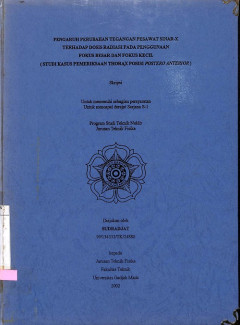
Pengaruh Perubahan Tegangan Pesawat Sinar-X Terhadap Dosis Radiasi Pada Pengg…
Penggunaan fokus yang berbeda pada pemeriksaan thorax posisi postero anterior akan ikut mempengaruhi dosis radiasi pasien sehingga perlu diketahui seberapa besar dosis radiasi yang diterima pasien saat menggunakan fokus besar dan fokus kecil. (Jml)
- Edisi
- -
- ISBN/ISSN
- -
- Deskripsi Fisik
- xii, 56 p. : Illus. ; 14 cm
- Judul Seri
- -
- No. Panggil
- 621.48 SUD p
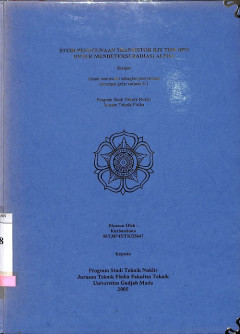
Studi Penggunaan Transistor BJT Tipe NPN Untuk Mendeteksi Radiasi Alpha
Radiasi alpha yang mengenai transistor akan menyebabkan tegangan berlebih pada tegangan operasionalnya. Oleh karena itu perlu diteliti kemungkinannya untuk dijadikan detektor karena selama ini harganya mahal. Terlebih lagi detektor semikonduktor memanfaatkan lapisan pengosongan yang juga dimiliki oleh transistor. Pada penelitian ini sumber radiasdi menggunakan Am-241 dan transistor beroperasi d…
- Edisi
- -
- ISBN/ISSN
- -
- Deskripsi Fisik
- xv, 71 p. : Illus. ; 17 cm
- Judul Seri
- -
- No. Panggil
- 621.48 KUS s
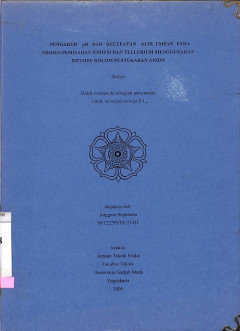
Pengaruh pH Dan Kecepatan Alir Umpan Pada Proses Pemisahan Iodium dan Telluri…
Pemisahan Iodium dari bahan bakunya Tellurium dengan menggunakan metode pemisahan kolom pertukaran anion dipengaruhi oleh banyak faktor, diantaranya yaitu pH dan kecepatan alir umpan. Oleh karena itu, perlu diteliti efisiensi pemisahan menggunakan metode kolom pertukaran anion serta bagaimana pengaruh pH dan kecepatan alir umpan pada proses tersebut. Dari penelitian ini diharapkan dapat diketah…
- Edisi
- -
- ISBN/ISSN
- -
- Deskripsi Fisik
- xv, 48 p. : Illus. ; 12 cm
- Judul Seri
- -
- No. Panggil
- 621.48 SEP p
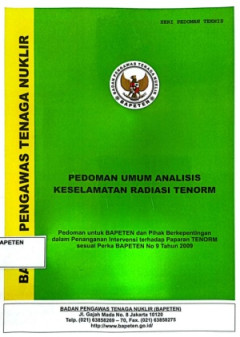
Pedoman Umum Analisis Keselamatan Radiasi Tenorm
Pedoman ini diharapkan mampu memberikan panduan atas pelaksanaan penanganan TENORM di fasilitasi penghasil sebagaimana telah diatur dalam Peraturan Kepala BAPETEN No.9 Tahun 2009 mengenai "Intervensi terhadap Paparan yang Berasal dari Technologically Enhanced Naturally Ocurring Radioactive Material (TENORM)"
- Edisi
- -
- ISBN/ISSN
- -
- Deskripsi Fisik
- 67 p. : illus. ; 25,5 cm
- Judul Seri
- Seri Pedoman Teknis
- No. Panggil
- 628.535
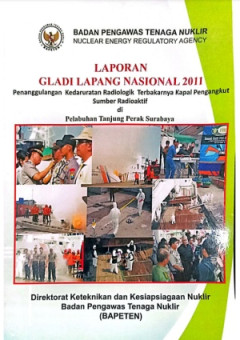
Laporan Gladi Lapang Nasional 2011: Penanggulangan Kedaruratan Radiologik Ter…
Geladi Lapang Nasional Penanggulangan kedaruratan radiologik terbakarnya kapal pengangkut sumber radioaktif di Pelabuhan Tanjung Perak Surabaya ini dilaksanakan dalam rangka mengimplementasikan amanat UU Ketenaganukliran No. 10 Tahun 1997 dan Perka 1 Tahun 2010. Selain itu bertujuan menguji kesiapan dan kemampuan instansi terkait yang ada, untuk melakukan penanggulangan atau tanggap darurat dal…
- Edisi
- -
- ISBN/ISSN
- -
- Deskripsi Fisik
- 38 p. : Illus. ; 29,5 cm
- Judul Seri
- -
- No. Panggil
- 621.48 BAP L L
 Karya Umum
Karya Umum  Filsafat
Filsafat  Agama
Agama  Ilmu-ilmu Sosial
Ilmu-ilmu Sosial  Bahasa
Bahasa  Ilmu-ilmu Murni
Ilmu-ilmu Murni  Ilmu-ilmu Terapan
Ilmu-ilmu Terapan  Kesenian, Hiburan, dan Olahraga
Kesenian, Hiburan, dan Olahraga  Kesusastraan
Kesusastraan  Geografi dan Sejarah
Geografi dan Sejarah